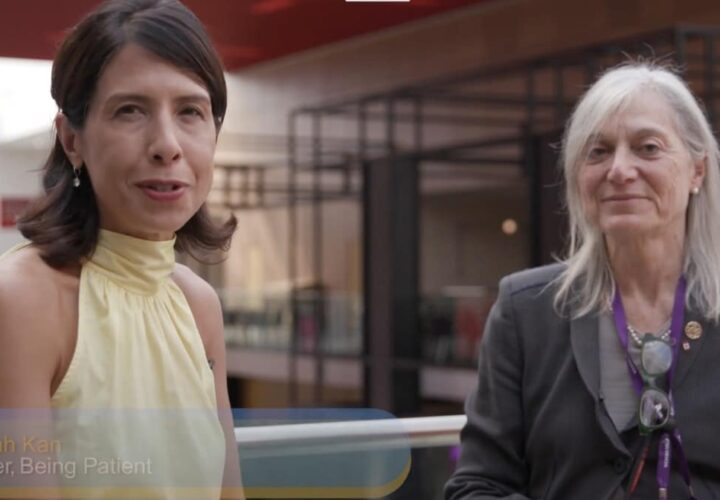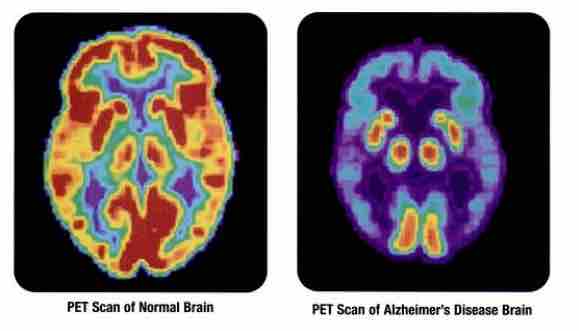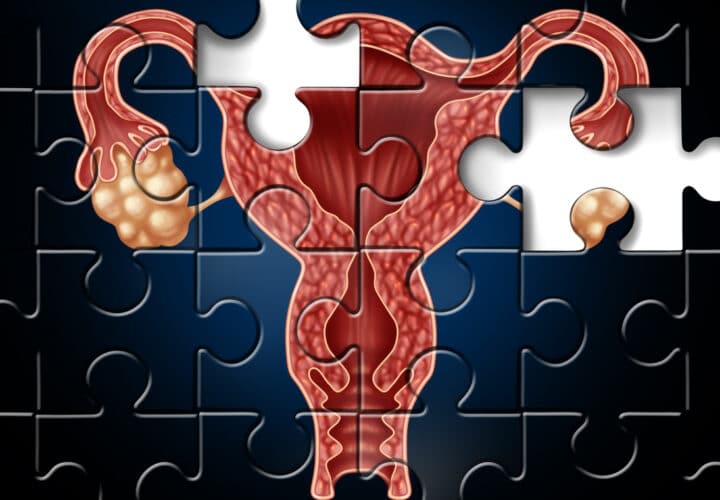One of the risk factors for Alzheimer's may be menopause. Neuroscientist Gillian Einstein explains why.
Estrogen’s role in the brain is complicated when it comes to how it affects memory. According to neuroscientist Gillian Einstein, Ph.D, at the University of Toronto, estrogen’s impact on brain health depends on how big of a drop an individual woman experiences during events like menopause, for example. We spoke to Einstein about her ongoing study on how the removal of ovaries affect the memory of young women in their 30s and 40s.
A key preliminary finding is that hormone replacement therapy greatly benefits the brain health of women whose bodies no longer make estrogen naturally.
- Estrogen helps make connections between neurons and helps grow neurons.
- One of the risk factors for Alzheimer’s may be menopause, whether it occurs naturally or earlier in life with the removal of ovaries.
- The lowering of estrogen removes a protective effect on the brain.
Watch the full conversation below or read on for a transcript of our conversation with University of Toronto neuroscientist Gillian Einstein about menopause and memory loss — along with her guidance to women with Alzheimer’s in their families.
Being Patient: What role do hormones play in our brain?
Gillian Einstein: Well, we know from animal studies that estrogens and androgens have receptors in the brain on neurons as well as glial cells. So the cells that communicate with each other and the cells that protect the cells that communicate with each other are all responsive to estrogens and androgens. There are receptors on those cells and the receptors enable the estrogens and androgens to have both short-term and long-term effects.
Being Patient: Most importantly, and what a lot of women would want to know is, when you reach menopausal age and you have a drop in estrogen, what does that mean for your brain?
Gillian Einstein: Well, it’s a complicated question because it depends on each woman. It depends really on where you started with estrogen and where you ended up with estrogen in menopause. And if you don’t end up too different than where you started, you’re probably in pretty good shape. If you have a big drop in estrogen, then that might be a problem.
Being Patient: So, how does this open the door for opportunities in research related to Alzheimer’s disease and hormonal levels?
Gillian Einstein: The risk factors in Alzheimer’s disease for men and women have been known to be different. And in women, one of the risk factors is menopause. It’s not as strong as age itself, or ApoE status, but the lowering of estrogens removes a protective effect on the brain. And this protective effect does have to do with making connections between neurons and growing neurons, which estrogen is so good at doing. People have begun to hypothesize that menopause itself might be a risk factor, but I have to emphasize that it really depends on individual women.
Being Patient: Are we seeing more women with early-onset Alzheimer’s?
Gillian Einstein: I don’t think we are seeing significantly more women with early-onset, unless you look at the population of women who’ve had a severe hormonal drop, then they would probably have an earlier onset. But we don’t completely know that yet.
I do think if you looked at a particular group of women, you would see that among women who had their ovaries removed, and therefore are no longer making their own estrogen, they have a higher risk.
Being Patient: You said different women have different declines in estrogen. If it’s a more significant drop, what is that drop exactly?
Gillian Einstein: Obviously, a more significant drop depends on what you made before. Usually, in measuring estrogen in the urine, it’s about 30 picograms per mil. It seems like a very small amount, but it’s a small amount that has a big effect.
In the blood, it’s a completely different kind of measure. If you really want to know what your brain is seeing, spit into a tube and give somebody your saliva to analyze.
Being Patient: Where are we in research, as far as knowing how hormones impact Alzheimer’s? What is research trying to address in the longer term?
Gillian Einstein: Research is trying to address how estrogen loss, either through natural menopause, or prior to natural menopause, might set the stage for quicker neuro-degeneration, loss of neurons, accumulation of beta-amyloid, etc. One of the unfortunate things about this field is that, even though over 70 percent of the populations being studied are women, people aren’t reporting their results as women and men. And they’re not actually looking at risk factors particularly salient for women such as estrogen levels or loss of estrogen.
Being Patient: You studied women who had their ovaries removed at a younger age. Tell me a little bit about that study and what you determined from it.
Gillian Einstein: We’re studying women who had their ovaries removed for medical reasons. They’re a very healthy population, most of them have their ovaries removed between the ages of 35 and 45, so our average age is around 45. We’re asking them questions about memory, giving them memory tests, and doing brain scans; we’re also looking at immune function and inflammation, and we’re starting to hopefully gather biomarkers. And what we’ve found is that they have changes in remembering a story or remembering a list of words over a delayed period. Women who have had their ovaries removed do more poorly on those tasks. This is also correlated with the volume of the brain area that’s very vulnerable in Alzheimer’s disease, called the hippocampus.
Being Patient: The preliminary conclusion is hormone replacement therapy greatly benefits these women in terms of brain health?
Gillian Einstein: It helps them, that’s for sure. The other thing is, if you still have your uterus, that means that you need to have progesterone, and you want a natural progesterone, you do not want a synthetic progesterone. Meta-analysis studies show that the synthetic progesterone seems to be a pretty bad actor.
I really feel that people have underestimated estrogens for an awfully long time. First of all, people haven’t really gotten the connection between the ovaries and the brain. What other drug have people been put on besides hormone replacement where they were put on it like it was candy and then ripped off it like it had no effect? Estrogens and androgens are very powerful actors. They act all over the body – they act on bone, they act on heart. Every single body system is sensitive to them.
The message I would have for people who have Alzheimer’s disease in their family is to keep your ovaries if you possibly can. And if you have them taken out, really seriously consider hormone replacement.




